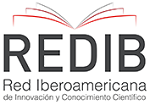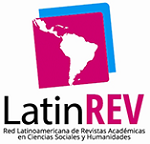Personal aspects that affect the digital competence of university teachers in Perú
DOI:
https://doi.org/10.15649/2346030X.4487Keywords:
teaching digital competence, university teacher, personal aspects, digital skills, universityAbstract
This research sought to establish whether there is a relationship between personal characteristics and the digital skills of university teachers in Peru. We chose to work with the quantitative type. The descriptive correlational design was applied. It was collected by means of a questionnaire instrument with 42 questions on a five-level Likert scale, which previously had the respective validity and reliability. The information was processed with percentage data, frequency tables and graphs. A Spearman's Rho test analysis was performed with SPSS software, which evaluated the relationship between two random variables, one continuous and the other discrete. A teacher's digital skills are determined by personal factors such as age, area of specialization, employment status, amount of time in service and access to technological equipment. It was found that the degree of digital skills of university teachers is intermediate, reaching 58%. This also applies to the dimensions of communication, collaboration and digital security, digital content creation and problem solving. There is a positive correlation between individual factors and the digital skills of university teachers.
References
E. López, “Factores personales y competencia digital en docentes universitarios de la UNCP,” 2024.
M. Briceño, S. Correa, M. Valdes, and M. Hadweh, “Modelo de gestión educativa para programas en modalidad virtual de aprendizaje,” 2020, [Online]. Available: https://www.redalyc.org/articulo.oa?.
S. Reinoso, “Educación en tiempos de Covid-19,” Odontología Activa Revista Científica, vol. 5, no. 2, pp. I–II, May 2020, doi: 10.31984/OACTIVA.V5I2.463.
L. Alejaldre and E. Álvarez, “La competencia digital docente del profesor universitario 3.0,” 2019.
E. Barrientos, M. Briceño, W. Suarez, and M. Valdez, “Cultura organizacional inclusiva en instituciones de educación superior chilenas.” Accessed: Feb. 29, 2024. [Online]. Available: https://www.produccioncientificaluz.org/index.php/rvg/article/view/36872/39854.
Á. Acevedo, A. J. Argüello, and B. G. Pineda, “Competencias del docente en educación online en tiempo de COVID-19 : Universidades Publicas de Honduras Teacher competences in online education in time of COVID- 19 : Public Universities of Honduras,” 2020.
M. Duran, “Competencia Digital del Profesorado Universitario: Diseño y Validación de un Instrumento para la Certificación,” 2019, Accessed: Mar. 01, 2024. [Online]. Available: https://digitum.um.es/digitum/bitstream/10201/72083/1/TESIS-%20FORMATO%20DIGITAL%20%28ADICIONAL%20sin%20art%c3%adculos%29.pdf.
A. Araya, “Calidad de servicio en educación superior a distancia,” 2017.
L. Castañeda, F. Esteve, and J. Adell, “Why rethinking teaching competence for the digital world?,” Jan. 31, 2018, Universidad de Murcia. doi: 10.6018/red/56/6.
A. Díaz-Burgos, J. N. García-Sánchez, M. L. Álvarez-Fernández, and S. M. de Brito-Costa, “Psychological and Educational Factors of Digital Competence Optimization Interventions Pre- and Post-COVID-19 Lockdown: A Systematic Review,” Jan. 01, 2024, Multidisciplinary Digital Publishing Institute (MDPI). doi: 10.3390/su16010051.
M. Rojas-Osorio, S. Del-Aguila-Arcentales, and A. Alvarez-Risco, “Self-perception of university teachers on their digital teaching competence: the case of Peru,” Journal of Applied Learning and Teaching, vol. 7, no. 1, Jan. 2024, doi: 10.37074/jalt.2024.7.1.8.
J. Diao and Y. Qu, “Teaching competence of TVET teachers in the digital age: Implementation and evaluation of a training program in China,” Eval Program Plann, vol. 103, p. 102402, Apr. 2024, doi: 10.1016/J.EVALPROGPLAN.2024.102402.
A. R. Baiges, J. L. Lázaro-Cantabrana, and J. H. García, “Improving teachers‘digital competence, moving towards institutional digital maturity: a systematic review,” Jun. 01, 2024, GTE-Educational Technology Group, University of the Balearic Islands. doi: 10.21556/edutec.2024.88.3143.
M. Liesa-Orus, R. Lozano Blasco, and L. Arce-Romeral, “Digital Competence in University Lecturers: A Meta-Analysis of Teaching Challenges,” May 01, 2023, MDPI. doi: 10.3390/educsci13050508.
M. Zavala, M. Vasquez, and I. Gonzales, “Representación semántica de estudiantes universitarios sobre prácticas docentes innovadoras.” Accessed: Mar. 01, 2024. [Online]. Available: https://dilemascontemporaneoseducacionpoliticayvalores.com/index.php/dilemas/article/view/1966/2024.
D. Miguel-Revilla, J. M. Martínez-Ferreira, and M. Sánchez-Agustí, “Assessing the digital competence of educators in social studies: An analysis in initial teacher training using the TPACK-21 model,” Australasian Journal of Educational Technology, vol. 36, no. 2, pp. 1–12, May 2020, doi: 10.14742/AJET.5281.
J. Nagy and I. Dringó-Horváth, “Factors Influencing University Teachers’ Technological Integration,” Educ Sci (Basel), vol. 14, no. 1, 2024, doi: 10.3390/educsci14010055.
C. Mejia-Solano, F.-I. Revuelta-Domínguez, D. M. Ayala, A. González-Pérez, and D. Mejia-Ayala, “Digital competence of the university teacher. A systematic literature review 2015-2022,” Proceedings of the LACCEI international Multi-conference for Engineering, Education and Technology, 2023, doi: 10.18687/LACCEI2023.1.1.1103.
B. Hidalgo and M. Gisbert, “Análisis de las competencias digitales del profesorado universitarios desde el modelo TPACK (conocimiento tecnológico y pedagógico del contenido),” INNOVA Research Journal, vol. 5, no. 3.2, pp. 79–96, Dec. 2020, doi: 10.33890/innova.v5.n3.2.2020.1513.
J. García González, N. L. Serna Saucedo, H. Alvarado Lumbreras, and J. A. Peña Martínez, “Evaluación de competencias digitales en la educación superior.,” 2019.
Y. V.-F. A. Ocaña-Fernández, “Gestión del conocimiento y tecnologías de la información y comunicación (TICs) en estudiantes de ingeniería mecánica,” Apuntes Universitarios. Accessed: Sep. 25, 2024. [Online]. Available: https://apuntesuniversitarios.upeu.edu.pe/index.php/revapuntes/article/view/419/492.
G. Siemens and D. Leal, “Conectivismo: Una teoría de aprendizaje para la era digital,” 2004.
R. Hernandez, C. Fernandez, and P. Baptista, Metodologia de la investigacion. 2014.
M. Gómez-Gómez, R. Hijón-Neira, L. Santacruz-Valencia, and D. Pérez-Marín, “Evolución de la percepción de la competencia digital en la formación universitaria del profesorado tras la enseñanza remota de emergencia,” Revista Portuguesa de Educação, vol. 37, no. 1, p. e24016, Jun. 2024, doi: 10.21814/rpe.29708.
J. Cabero-Almenara, J. Barroso-Osuna, J. J. Gutiérrez-Castillo, and A. Palacios-Rodríguez, “The teaching digital competence of health sciences teachers. A study at andalusian universities (Spain),” Int J Environ Res Public Health, vol. 18, no. 5, pp. 1–13, Mar. 2021, doi: 10.3390/ijerph18052552.
B. L. Gómez, P. S. Thevenet, and M. R. G. Bellido, “Digital Competency preparation in teachers,” Profesorado, vol. 23, no. 4, pp. 234–260, Dec. 2019, doi: 10.30827/PROFESORADO.V23I4.11720.
C. Arispe and Y. Yangali, “Factores personales en la percepción hacia las tecnologías de información y comunicación que influyen en la competencia digital en docentes de posgrado.” Accessed: Mar. 01, 2024. [Online]. Available: https://revistas.um.es/reifop/article/view/506921/319671.
M. Sánchez and E. Rodríguez, “Competencia digital en docentes de Ciencias de la Salud de una universidad privada de Lima,” Educ Med Super, vol. 35, no. 1, 2021, [Online]. Available: https://ems.sld.cu/index.php/ems/article/view/2060.
I. Zamora, H. Lopez, and M. Zamora, “Competencias digitales docentes en profesores de universidad: Autoevaluación y factores asociados.” Accessed: Jan. 27, 2024. [Online]. Available: https://oactiva.ucacue.edu.ec/index.php/oactiva/article/view/463.
J. Suárez, G. Almerich, I. Diaz, and R. Fernandez, “Competencias del profesorado en las TIC. Influencia de factores personales y contextuales,” no. 1, pp. 293–309, 2012.
G. Orozco, M. Cabezas, F. Martínez, and G. Abaunza, “Variables sociodemográficas que inciden en las competencias digitales del profesorado universitario,” Scielo, 2020, doi: 10.1590/SciELOPreprints.1055.
S. Mariscal, N. Ruiz, and J. Guerrero, “La edad como factor determinante en la competencia digital docente,” 2021. [Online]. Available: http://revistas.bnjm.cu/index.php/BAI/article/view/450.
J. Cabero, J. Barroso, and A. Palacios, “Estudio de la competencia digital docente en Ciencias de la Salud. Su relación con algunas variables,” Educacion Medica, vol. 22, no. 2, pp. 94–98, Mar. 2021, doi: 10.1016/j.edumed.2020.11.014.
K. Kounenou, P. Roussos, V. Yotsidi, and M. Tountopoulou, “Trainee Teachers’ Intention to Incorporating ICT Use into Teaching Practice in Relation to their Psychological Characteristics: The Case of Group-based Intervention,” Procedia Soc Behav Sci, vol. 190, pp. 120–128, May 2015, doi: 10.1016/J.SBSPRO.2015.04.925.
M. Sánchez, L. Fabián, and D. Melgoza, “Competencias digitales docentes: Una experiencia en el nivel Universitario,” HAMUT’AY, vol. 8, no. 1, p. 59, May 2021, doi: 10.21503/hamu.v8i1.2236.
C. Laurente, R. Rengifo, N. Asmat, and L. Neyra, “Desarrollo de competencias digitales en docentes universitarios a través de entornos virtuales: experiencias de docentes universitarios en Lima.,” Eleuthera, vol. 22, no. 2, pp. 71–87, Dec. 2020, doi: 10.17151/eleu.2020.22.2.5.
Downloads
Published
How to Cite
Issue
Section
Altmetrics
Downloads
License
Copyright (c) 2025 AiBi Journal of Research, Administration and Engineering

This work is licensed under a Creative Commons Attribution 4.0 International License.
The journal offers open access under a Creative Commons Attibution License

This work is under license Creative Commons Attribution (CC BY 4.0).











